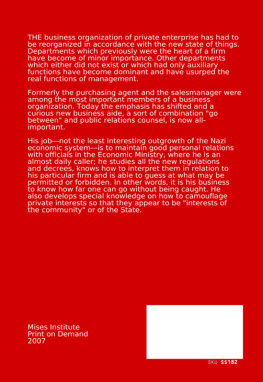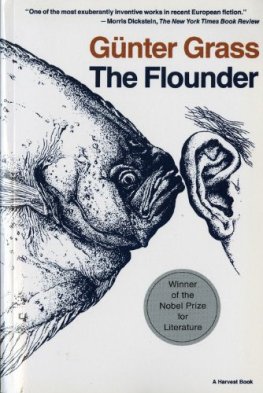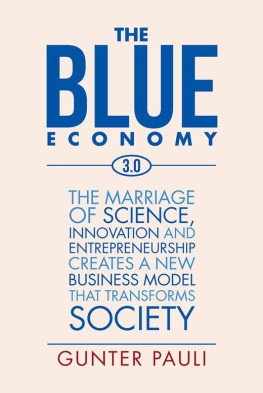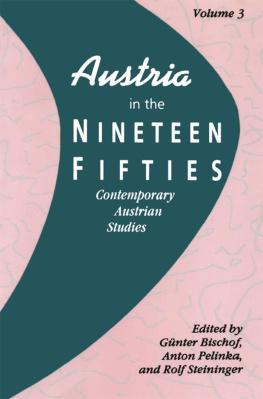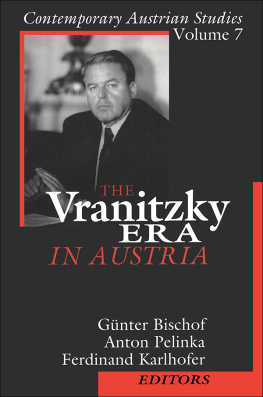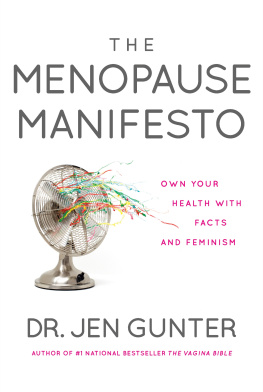Günter Reimann - The Vampire Economy
Here you can read online Günter Reimann - The Vampire Economy full text of the book (entire story) in english for free. Download pdf and epub, get meaning, cover and reviews about this ebook. publisher: Mises Institute, genre: Politics. Description of the work, (preface) as well as reviews are available. Best literature library LitArk.com created for fans of good reading and offers a wide selection of genres:
Romance novel
Science fiction
Adventure
Detective
Science
History
Home and family
Prose
Art
Politics
Computer
Non-fiction
Religion
Business
Children
Humor
Choose a favorite category and find really read worthwhile books. Enjoy immersion in the world of imagination, feel the emotions of the characters or learn something new for yourself, make an fascinating discovery.
- Book:The Vampire Economy
- Author:
- Publisher:Mises Institute
- Genre:
- Rating:4 / 5
- Favourites:Add to favourites
- Your mark:
- 80
- 1
- 2
- 3
- 4
- 5
The Vampire Economy: summary, description and annotation
We offer to read an annotation, description, summary or preface (depends on what the author of the book "The Vampire Economy" wrote himself). If you haven't found the necessary information about the book — write in the comments, we will try to find it.
The Vampire Economy — read online for free the complete book (whole text) full work
Below is the text of the book, divided by pages. System saving the place of the last page read, allows you to conveniently read the book "The Vampire Economy" online for free, without having to search again every time where you left off. Put a bookmark, and you can go to the page where you finished reading at any time.
Font size:
Interval:
Bookmark:
Gnter Reimann
THE VAMPIRE ECONOMY
DOING BUSINESS UNDER FASCISM
THE VAMPIRE ECONOMY
WHAT A GERMAN AUTO MANUFACTURER HAS
TO DO TO GET 5,000 TIRES FOR HIS CARS
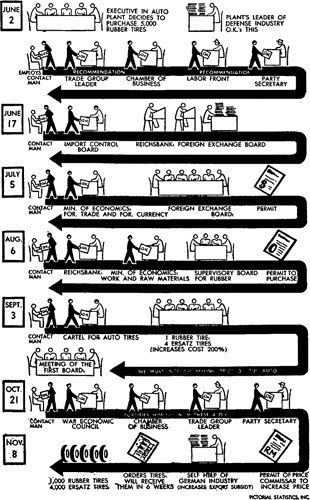

Mises Institute
Print on Demand
2007
ISBN: 9781610160384
THIS book could never have been written without the help of numerous friends and acquaintances in Europe who gave generously of their knowledge and experience and helped me to clarify manifold new trends and phenomena. During my stay in Europe I met many people of all social classes who lived or traveled in fascist countriesbankers, industrialists, importers and exporters, fascist or Nazi journalists, and radical opponents of the totalitarian states. Many of these people frankly discussed all the questions I raised. They helped me solely with the object of making the truth known; they had no private axes to grind. These collaborators must remain anonymous; the confidence and trust they reposed in me have placed upon me the grave responsibility of concealing their identity so that no evil will come to them or to their friends in Germany or Italy.
A number of American friends were very helpful in revising and improving this work. I am especially obligated to Miss Dorothy Davis, to Dr. Henri David, to Mrs. Edna Mann, to Dr. Ruben Gotesky, to Mr. Liston M. Oak, and to Dr. Sterling Spero. Needless to say, I am solely responsible for any statements made in this book.
I also wish to thank the editors of Harpers Magazine and of The New Republic for permitting me to use material from articles of mine published by them.
GUENTER REIMANN
THIS book may be helpful as an answer to these burning questions: Why did Hitler start another war? How did it become possible that the Fuehrer could lead millions of intelligent and cultured people, who hate senseless slaughter, into a war which must have devastating effects upon Germany as well as upon the whole of mankind?
We cannot be satisfied with the answer that Hitler is a madman and that the German people are fools and slaves willing to go to war to satisfy a madmans dreams. Most people in Germany are like people in other countries, hard working and decent, with human qualities as good and as bad as those of other people throughout the world. But a system has been built up which has enabled one man to decide about war or peace; a system which held and still holds a whole nation in its iron grip and does not allow any individual German to escape the inherent fatalities of this regime.
The fatalism which was typical of the spirit of the German businessman before Europe was plunged into this war was not due to economic difficulties alone, but far more to a feeling that he had become part of a machine inexorably leading him to disaster. German businessmen once believed that the Fuehrer would lead them into a world of happiness and prosperity. They were willing to accept the first measures of regimentation as necessary but temporary emergency acts. They thought of the raids against the Jews and the sadistic brutalities of the Brownshirts as the excesses of uncontrollable elements which would soon disappear. These hopes had vanished before the start of the war. Those who hated bureaucracy and regimentation had been compelled to participate in the construction of a system which could end only in war and destruction. They had been made part of a monster-machine steered by a Fuehrer who was responsible to nobody.
This totalitarian Frankenstein could not exist peacefully. It could not transform armaments production into production of consumption goods, thus ending the war scare and creating another era of prosperity. Nor could it wait for the peaceful exploitation of new conquests which, as a matter of fact, were not sufficient to correct the shortage of basic raw materials. Any attempt to create a new era of peace would have precipitated a major crisis, economically and politically, for the totalitarian regime, and this would have meant the end of all far-reaching imperialist plans. Sacrifices and investments made in preparation for imperialist expansion and for world rule would have been in vain. The gradual decay of the totalitarian regime would have been inevitable had the Fuehrer chosen peace instead of war.
History is revengeful. Dictators are also dictated to by the necessities of their own regime. The logic of the machine crushes the constructor and turns him into its slave, says Emil Ludwig.
We do not know what Adolf Hitler thought about Germanys capacity for waging totalitarian warfare when he decided to march into Poland and thus begin a new world war. It may be that he was convinced he would get another Munich without a large-scale war, or that he could conclude a peace with honor, i. e., with Poland as a Nazi protectorate, a few weeks after the outbreak of a war with the Western Powers. Yet he must have realized that this war might become a major conflict, lasting many months, perhaps even years. How long can the Nazi economy stand the strain of such a war?
During the last pre-war years tremendous economic preparations were made for this conflict. German Army experts had worked out two schemes, one in preparation for a short Blitzkrieg or lightning war, the second for a longer totalitarian war of attrition. The first plan was completed during the first Four-Year Plan. Then preparations for the longer totalitarian war were pushed through.
In accordance with these plans of the German General Staff, the Third Reich was getting ready for a two-year totalitarian war. But what such a war meant in practice depended on who was to be the enemy and who the ally. It is impossible to have on hand sufficient stocks of all essential materials needed for a totalitarian war of even a single years duration. According to all estimates, Nazi Germanys fuel reserves during the Munich crisis would have been sufficient for a totalitarian war of not more than four months. But these same reserves might be quite sufficient if Rumanian and Russian oil is available in large quantities. Furthermore, the consumption of materials in a totalitarian war depends also on whether an aggressive or a defensive war is being contemplated. If, for instance, the war becomes purely defensive on all fronts and no large-scale offensives are carried out, consumption of war materials will be considerably less than in an offensive war, and the economic reserves of German militarism will last longer. But a defensive war cannot last forever and Germanys economic reserves will be exhausted earlier than those of the Western Powers if the latter are able to import materials from overseas.
The whole aspect of Germanys wartime economy seems to have changed as a result of the Stalin-Hitler pact. This pact assures the Third Reich that the Soviet Union will not stop exports to Germany even in wartime. Russian oil, manganese, foodstuffs and necessary materials will be available during the war, according to the terms of the Treaty signed on the eve of the wars outbreak. This pact is helpful to Hitler in overcoming economic deficiencies and in enabling him to avoid an early collapse of the military machine. Yet the economic significance of this pact may be overestimated. Stalin and Hitler did not decide to pool their economic and military forces. They are unlikely to do that because they do not sufficiently trust each other. Stalin will, however, sell Russias products to the German militarists if he gets cash or other goods he needs in exchange. The size of this wartime trade will depend on the capacity of the Third Reich to pay for imports. Reserves of foreign currency or gold are negligible. Exports of German manufactured goods are restricted by the urgent demands of the army for arms and ammunition. The financial plight of the Third Reich makes it impossible to finance imports in unlimited quantities. Therefore, the pact with Stalin may enable Hitler to put up a more stubborn and longer fight, but will not necessarily solve his raw material difficulties.
Next pageFont size:
Interval:
Bookmark:
Similar books «The Vampire Economy»
Look at similar books to The Vampire Economy. We have selected literature similar in name and meaning in the hope of providing readers with more options to find new, interesting, not yet read works.
Discussion, reviews of the book The Vampire Economy and just readers' own opinions. Leave your comments, write what you think about the work, its meaning or the main characters. Specify what exactly you liked and what you didn't like, and why you think so.

